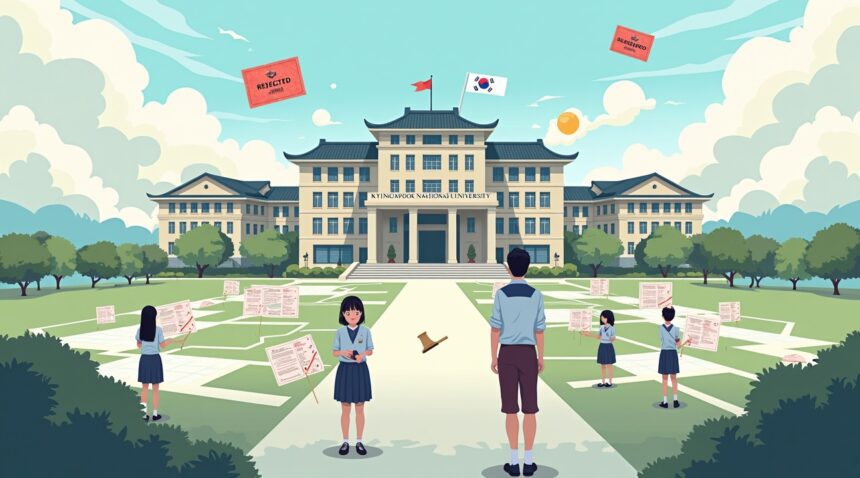Six of South Korea’s most prestigious national universities made history during the 2025 admissions cycle by rejecting 45 academically exceptional students based solely on their documented bullying records, signaling a historic shift in educational values.
Key Takeaways
- Kyungpook National University led the initiative by rejecting 22 students for bullying histories.
- Pusan National University followed with 8 rejections, showing wider adoption of the new screening practice.
- Seoul National University, the nation’s most prestigious institution, rejected 2 applicants despite its elite status.
- The policy was a response to a 2023 scandal involving a prosecutor’s son with a bullying record admitted to Seoul National University, igniting national calls for reform.
- Starting in 2026, all Korean universities will legally be required to implement point deduction systems for applicants with documented bullying histories.
- Four national universities opted not to reject any applicants, limiting character evaluations to specific admission tracks such as athletic programs.
- Legal challenges emerged quickly, as wealthier families began hiring attorneys to challenge school disciplinary records, raising concerns of inequity.
The Beginning of a New Admissions Ethos
This groundbreaking approach represents more than a policy adjustment. Universities now prioritize character development alongside academic excellence, acknowledging that students with histories of harmful behavior may impact campus safety and culture.
The Influence of the 2023 Scandal
The transformation was prompted by public outcry following a 2023 scandal in which a former prosecutor’s son was admitted to Seoul National University despite well-documented bullying behavior. The backlash led the public and educational leaders to push for more holistic admissions processes that include character evaluation.
Kyungpook’s Leadership Role
Kyungpook National University‘s leadership in this initiative demonstrated institutional courage by rejecting 22 promising students over conduct issues. This act sent a strong message nationally: academic merit alone is no longer sufficient.
Universities’ Varying Approaches
While Kyungpook led the effort, other institutions followed to different extents. Pusan National University denied admission to 8 applicants with bullying records, while Seoul National University only released 2, despite public expectations. This disparity indicates that universities are still fine-tuning their character-screening frameworks.
The Legal Mandate Arriving in 2026
In response to public demand, the Korean government passed a law mandating that, beginning in 2026, all universities implement standardized point deduction systems for bullying histories. This policy seeks to make character evaluation a permanent feature of the admissions process, not just a reaction to controversy.
Socioeconomic Concerns
However, implementation has brought unintended side effects. Families with the financial means are increasingly hiring lawyers to contest disciplinary records. This creates a dual-system where wealthy students may avoid consequences while less privileged students face lasting penalties.
Cautious Institutions and Legal Uncertainty
Four universities adopted a reserved stance by limiting their evaluations to specific programs, such as athletic tracks, where character has traditionally been scrutinized more heavily. Their restraint reflects ongoing discussions about where and how broadly character screening should apply.
Legal Fallout and Inequity
Legal professionals specializing in education law report rising demand from families aiming to clean disciplinary records. This surge has raised concerns among educators and watchdogs about the commercialization of school discipline and its implications for equity.
Ensuring Fair Implementation
The policy’s long-term success will hinge on fair and consistent application across all socioeconomic groups. Universities must adopt transparent evaluation frameworks that allow for redemption and growth while maintaining fairness.
A New Path Forward in Global Admissions
South Korea’s evolving admissions practices echo global conversations about holistic evaluation in education. Assessing character alongside exam scores provides a fuller view of a student’s readiness for higher learning. Still, such assessments must be accessible to all, regardless of economic background.
The 2025 admissions cycle represents a pivotal moment in South Korean higher education. Institutions have made a powerful statement: character is as crucial as grades. This policy shift may not only reshape Korea’s academic landscape but could also influence reforms across Asia and even globally.
Kyungpook National University Leads with 22 Rejections as Six Top Schools Enforce New Standards
Six of South Korea’s ten leading national universities made history by rejecting 45 applicants with past bullying records during the 2025 admissions cycle. This unprecedented action demonstrates how seriously these institutions now take character assessment in their admission processes.
Breaking Down the Rejection Numbers
Kyungpook National University led this initiative by turning away the highest number of applicants, rejecting 22 students despite their academic achievements. I find this number particularly significant because it shows the university’s commitment to creating a safer campus environment.
The remaining rejections were distributed across five other institutions:
- Pusan National University rejected 8 applicants, with 6 eliminated during early admissions and 2 during regular admissions.
- Kangwon National University and Jeonbuk National University each turned away 5 students.
- Gyeongsang National University rejected 3 applicants through early admissions.
- Seoul National University, often considered the country’s most prestigious institution, rejected 2 applicants during regular admissions.
These numbers paint a clear picture of how different universities approach character screening. Some institutions conduct more thorough background checks during early admissions, while others focus their efforts on regular admission periods.
Universities Taking Different Approaches
Four national universities chose not to reject any applicants based on bullying history during this cycle. Chonnam, Jeju, Chungnam, and Chungbuk National Universities maintained different assessment criteria, focusing their character evaluations on specific admission categories rather than across all applications.
These institutions limit their bullying history assessments to particular admission tracks, such as athletic admissions where character evaluation might be considered more critical. This approach suggests that some universities are still developing comprehensive frameworks for handling applicants with problematic behavioral histories.
I notice this selective application of character standards raises questions about consistency across the national university system. While some schools implement blanket policies, others take more targeted approaches that may reflect different institutional priorities or resource limitations.
The variation in enforcement also highlights how universities interpret the importance of past behavior differently. Some view bullying history as disqualifying regardless of academic merit, while others consider it relevant only for specific programs or admission pathways.
This groundbreaking shift in admissions practices reflects broader societal changes in South Korea regarding bullying accountability. Universities are increasingly recognizing their role in addressing past misconduct and preventing future incidents on campus. The fact that even academically excellent students faced rejection shows these institutions prioritize character alongside scholastic achievement.
The implementation of these standards during the 2025 cycle marks a turning point for Korean higher education. Universities are sending a clear message that academic excellence alone isn’t sufficient for admission when coupled with a history of harmful behavior against peers.
These rejections represent more than just administrative decisions – they signal a cultural shift toward accountability and the protection of campus communities. Students entering these universities can expect environments where their safety and well-being are prioritized alongside academic pursuits.
Historic Policy Shift Puts Character on Equal Footing with Academic Excellence
South Korea’s educational landscape has undergone a dramatic transformation this admissions cycle. Top-tier institutions like Seoul National University and Kyungpook National University implemented character-based evaluation standards with unprecedented strictness, marking a fundamental shift in how these universities assess prospective students.
This groundbreaking approach treats an applicant’s disciplinary history and personal character as equally important factors alongside traditional academic measures such as College Scholastic Ability Test (CSAT) scores. Universities no longer view academic excellence as the sole determinant of admission worthiness. Instead, they’re examining the complete profile of each candidate, ensuring that future students demonstrate both intellectual capability and ethical behavior.
Comprehensive Implementation Across All Admission Pathways
The new character evaluation system affects every admission route available to Korean students. Key implementation details include:
- Early admissions programs now incorporate detailed character assessments through enhanced school record reviews and comprehensive interview processes
- Regular admissions that traditionally relied heavily on CSAT scores must now factor in behavioral evaluations
- Both pathways require universities to scrutinize applicants’ disciplinary histories with equal weight given to academic performance
- Character evaluation criteria apply uniformly across all participating institutions
Early admission candidates face particularly thorough scrutiny since these programs already emphasized holistic evaluation through school records and personal interviews. Regular admission applicants, who previously relied primarily on standardized test performance, now encounter character-based screening that wasn’t previously part of their evaluation process.
The policy represents more than just an additional hurdle for students with problematic backgrounds. Universities are fundamentally redefining what constitutes a qualified applicant, recognizing that academic brilliance without ethical foundation creates incomplete educational outcomes. This shift reflects growing awareness that future leaders must possess both intellectual capability and moral integrity.
Starting with the 2026 academic year, this transformation becomes even more comprehensive. All Korean universities will face legal obligations to implement point deduction systems for applicants with documented bullying histories. This mandate ensures that character evaluation won’t remain limited to elite institutions but will extend throughout the entire higher education system. Universities that currently lack character assessment protocols will need to develop comprehensive evaluation frameworks before the deadline.
The legal requirement eliminates any ambiguity about implementation timelines and standards. Universities can’t simply choose whether to participate in character-based admissions – they must develop systematic approaches to evaluating student behavior and implementing appropriate consequences for disciplinary infractions.
This policy shift arrives amid growing recognition that traditional academic metrics alone don’t predict student success or societal contribution. High-performing students with histories of bullying or other behavioral problems can create toxic campus environments that undermine educational goals. By prioritizing character alongside academics, universities aim to cultivate learning communities where all students can thrive without fear of harassment or intimidation.
The 45 rejected students represent just the beginning of this cultural transformation. These cases demonstrate that even exceptional academic performance can’t overcome significant character deficiencies under the new evaluation standards. Students and parents must now recognize that maintaining clean disciplinary records throughout their educational journey has become as crucial as achieving high test scores.
This development mirrors broader societal conversations about accountability and character in South Korean culture. Universities are positioning themselves as institutions that value ethical behavior and social responsibility, not just academic achievement. The policy sends a clear message that future educational and professional opportunities depend on demonstrating both intellectual capability and moral character throughout one’s academic career. Whether discussing technological advancement or educational reform, character considerations increasingly influence major institutional decisions.

School Violence Classification System Determines University Eligibility
South Korea operates under a comprehensive school violence classification system that categorizes disciplinary actions across nine distinct levels. This structured approach ranges from Level 1 violations, which typically result in minor consequences like written apologies, to Level 9 infractions that warrant the most severe punishment of expulsion from school.
Permanent Records and University Access
The classification system creates lasting consequences for students who receive disciplinary actions at Level 6 and above. These serious violations become permanently recorded in student files, and universities gain full access to this information during their admissions review process. This transparency ensures that higher education institutions can make informed decisions about prospective students’ character and past behavior.
Seoul National University pioneered strict enforcement measures even before the current policy wave. The prestigious institution already implemented a system that deducts up to 2 points from College Scholastic Ability Test (CSAT) scores for applicants who faced expulsion or school transfers due to bullying incidents. This early adoption demonstrated how academic excellence alone wouldn’t guarantee admission when behavioral concerns existed.
Escalating Standards Across National Universities
The recent wave of rejections affecting 45 students with outstanding academic records signals a significant shift in university admission practices. Other national universities have now adopted similarly strict standards, with many institutions implementing even more rigorous screening processes than Seoul National University’s point deduction system. These schools recognize that past behavioral patterns often predict future conduct, making character assessment just as crucial as academic achievement.
I’ve observed that this systematic approach reflects South Korea’s commitment to addressing school violence comprehensively. The classification system doesn’t just punish immediate infractions but creates accountability that extends into higher education opportunities. Universities can now identify students with histories of serious misconduct, regardless of how well they performed academically afterward.
The policy shift represents a cultural evolution where academic institutions prioritize creating safe learning environments. When schools reject students with Level 6 or higher violations, they send a clear message that behavioral standards matter as much as test scores. This approach encourages younger students to consider long-term consequences before engaging in bullying or violent behavior.
Recent entertainment industry discussions about character development, similar to those seen in Netflix’s latest anime series, often explore themes of accountability and personal growth. The university admission changes reflect these same principles in real-world educational settings, where past actions carry meaningful consequences for future opportunities.

Ex-Prosecutor’s Son Scandal Sparked Nationwide Reform Movement
The current strict admissions policies emerged directly from public fury over a shocking scandal that rocked South Korea’s education system in 2023. Former prosecutor Chung Sun-sin’s son became the catalyst for change when details of his case surfaced, revealing how he gained admission to Seoul National University despite a documented bullying history.
The scandal exposed glaring weaknesses in the university admissions process. Chung’s son had transferred schools following a bullying incident, yet Seoul National University only imposed a minimal 2-point deduction from his CSAT score before accepting him. This lenient treatment sparked nationwide outrage, particularly given his father’s high-profile position in the prosecutor’s office.
Public Backlash Forces System-Wide Changes
Citizens viewed the case as emblematic of Korea’s broader problems with privilege and corruption in education. Social media campaigns exploded across platforms, with thousands demanding accountability and reform. The incident highlighted how wealthy and well-connected families could shield their children from consequences while ordinary students faced harsher penalties.
The scandal created unprecedented pressure on universities and government officials. Education Minister Lee Ju-ho faced intense questioning in parliamentary sessions, while Seoul National University’s administration scrambled to defend their decision-making process. Student organizations joined protests, arguing that allowing bullies into prestigious universities sent dangerous messages about acceptable behavior.
This case marked a decisive turning point in Korean education policy. Lawmakers responded quickly by drafting legislation that strengthened conduct requirements for university admissions. The National Assembly passed measures requiring universities to implement stricter background checks and expand their review processes beyond academic achievements. Universities themselves began adopting zero-tolerance policies, recognizing that public trust depended on demonstrating genuine commitment to character-based admissions.
The ripple effects extended beyond admissions policies:
- High schools strengthened their anti-bullying programs, knowing that documented incidents could now permanently impact students’ futures.
- Parents began emphasizing character development alongside academic performance, understanding that past actions would follow their children throughout their educational journey.
The reform movement gained additional momentum when other universities announced similar policy changes. Yonsei University and Korea University quickly followed Seoul National University’s lead, implementing comprehensive conduct reviews for all applicants. This coordinated response demonstrated how the prosecutor’s son scandal had fundamentally shifted expectations across Korea’s entire higher education landscape.
The transformation reflects a broader cultural awakening about accountability and fairness in Korean society. What started as outrage over one privileged student’s preferential treatment evolved into comprehensive reforms affecting thousands of future applicants. Universities now face intense scrutiny over their admissions decisions, with the public demanding transparency and consistency in how they evaluate student character alongside academic merit.
Legal Battles and Social Divide Emerge Over New Admissions Standards
The implementation of South Korea’s new university admissions criteria has sparked an unprecedented wave of legal challenges, fundamentally altering how schools handle disciplinary matters. Students facing potential consequences now routinely seek legal representation to contest their records before universities can access them during the application process.
This surge in legal intervention has created what educators describe as a problematic shift in school discipline practices. Legal experts warn that the increased involvement of attorneys in student disciplinary proceedings threatens to transform punishment systems into commercial enterprises. Schools find themselves caught between maintaining fair disciplinary standards and navigating complex legal challenges that consume valuable time and resources.
The commercialization concerns extend beyond simple cost considerations. When families with financial means can hire legal teams to challenge disciplinary records while others cannot, the system risks creating inequitable outcomes based on economic status rather than the severity of misconduct or genuine rehabilitation efforts.
Divided Public Opinion Reflects Broader Social Tensions
Public reaction to these new admissions standards reveals deep divisions in South Korean society about justice, redemption, and second chances. Supporters argue that universities should consider character alongside academic achievement, viewing the policy as long-overdue accountability for serious misconduct like bullying.
These advocates believe excellent grades shouldn’t overshadow harmful behavior that affects fellow students. They contend that allowing students with documented bullying histories into prestigious institutions sends the wrong message about consequences and potentially perpetuates cycles of abuse in academic environments.
Critics, however, express serious reservations about permanently limiting opportunities based on past actions. They argue that denying university admission effectively eliminates pathways for rehabilitation and personal growth that education traditionally provides. This perspective emphasizes that young people should have opportunities to learn from mistakes rather than face lifelong consequences for adolescent behavior.
Mental health professionals have joined the debate, noting that rigid punishment systems may discourage students from seeking help or acknowledging problematic behaviors. Some worry that fear of permanent academic consequences could drive misconduct underground rather than encouraging accountability and genuine change.
The legal challenges have also highlighted inconsistencies in how different schools document and categorize disciplinary actions. What constitutes “bullying” varies significantly between institutions, creating concerns about fairness when these records determine university eligibility. Students argue that subjective interpretations of behavior shouldn’t carry such permanent consequences.
Educational administrators face mounting pressure to balance multiple competing interests. They must maintain safe learning environments while ensuring disciplinary procedures can withstand legal scrutiny. The time and resources devoted to defending disciplinary decisions have already begun affecting other educational priorities.
Some legal experts suggest that the current system may require fundamental restructuring to address these challenges effectively. They propose clearer guidelines for documenting misconduct, standardized rehabilitation programs, and time-limited consequences that allow for redemption while maintaining accountability.
The debate has even influenced popular culture discussions, with some drawing parallels to entertainment industry accountability measures. Just as award ceremonies grapple with recognizing achievement while addressing past conduct, South Korean universities now navigate similar complex judgments.
International education experts watching these developments note that South Korea’s approach represents a significant departure from traditional academic merit-based admissions. The outcomes of these legal battles and social debates may influence similar discussions in other countries grappling with balancing academic achievement against character considerations.
The ongoing legal disputes show no signs of diminishing as more families challenge disciplinary records. Universities continue implementing the new standards while courts work through the growing caseload of appeals and challenges.
This complex situation reflects broader questions about justice, redemption, and the role of education in both punishment and rehabilitation. As legal battles continue and public opinion remains divided, South Korea’s educational system faces fundamental questions about how to balance accountability with opportunities for growth and change.
Sources:
Firstpost – Perfect Grades But A School Bully? South Korea’s Top Universities Won’t Let You In
KoreanToIPK – Korean Universities Reject 45 Applicants for Past Bullying


